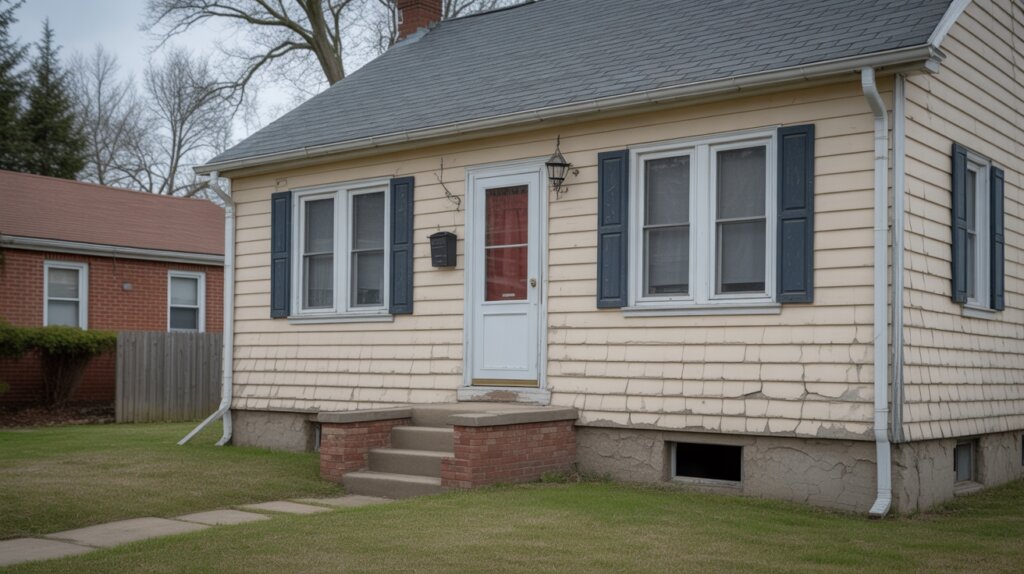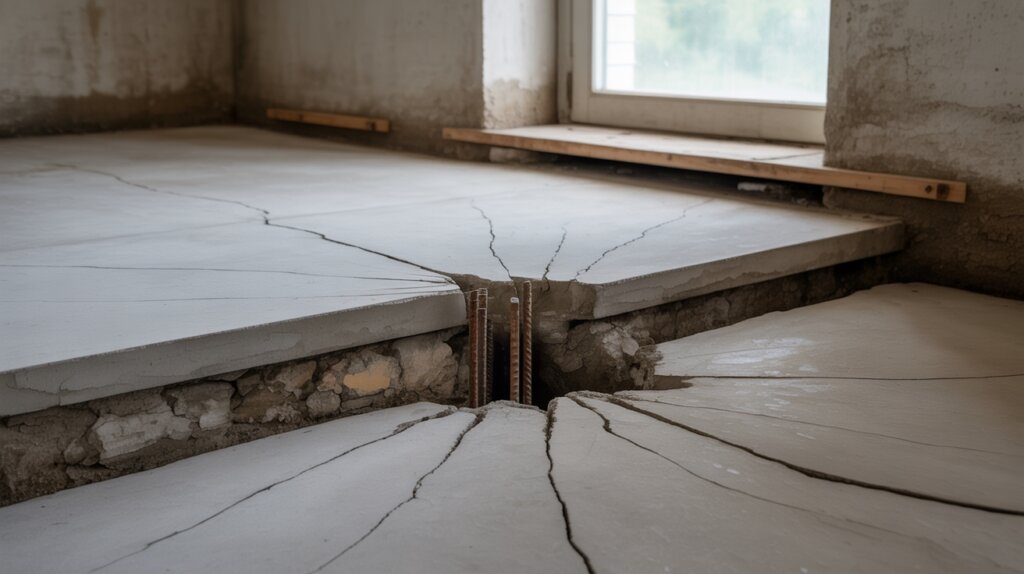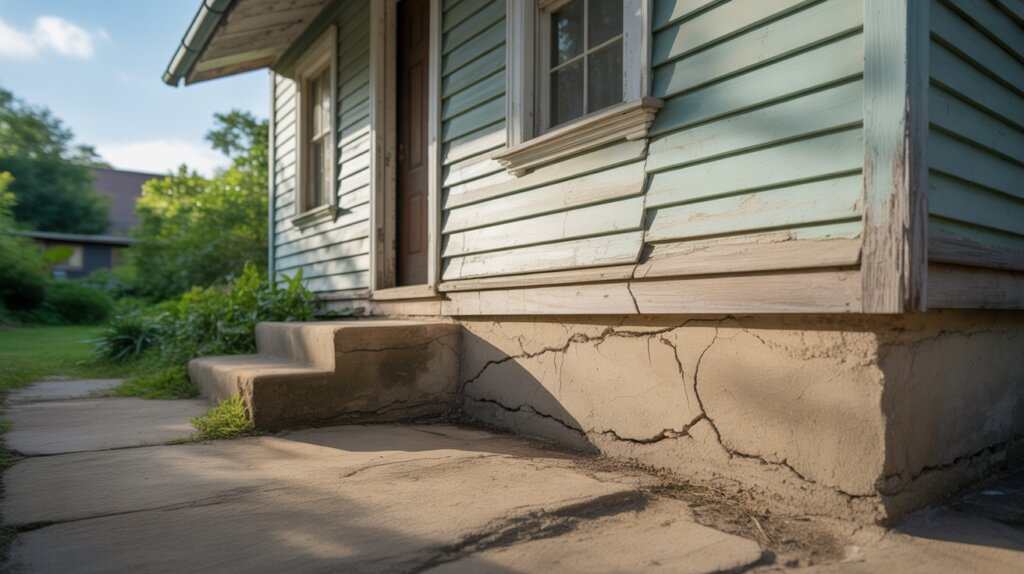Selling a house with foundation damage is a tough challenge for any homeowner. Potential buyers often hesitate when they hear about structural problems. This can make it hard to get a fair offer or sell quickly.
The problem gets worse because foundation issues can lower your home’s value. Many buyers worry about repair costs and safety concerns. This uncertainty can leave your house sitting on the market for a long time. You can sell a house with foundation damage as-is by knowing your options and being honest about its condition.
Working with the right strategy and clear information makes the process smoother. You can avoid costly mistakes and legal problems. This blog will guide you through each step so you can sell your damaged house with confidence and ease.
Key Takeaways
- Fully disclose all known foundation issues and provide inspection reports to comply with legal requirements and build buyer trust.
- Obtain professional repair estimates to accurately price the home and support negotiations with potential buyers.
- Target investors and cash buyers who are more likely to purchase homes with foundation problems as-is.
- Work with a real estate agent experienced in selling distressed properties to market the home effectively and reach the right buyer pool.
- Use staging and highlight neighborhood benefits to attract serious buyers and minimize the impact of foundation damage on buyer perception.
Understanding Foundation Damage and Its Impact on Home Value

Foundation damage can lower your home’s value. It raises concerns about safety and long-term stability. Buyers and lenders may avoid homes with these problems.
Foundation issues often cause uneven floors and wall cracks. Water can seep in, making the problem worse. If these issues exist, your home may only attract investors or cash buyers. Addressing liens and title issues early can also help ensure a smoother sale process when dealing with foundation problems.
Sellers should clearly document all foundation problems. Pricing the home honestly can help attract serious buyers. If you fix the damage, you may keep more of your home’s value. Recognizing soil issues and water damage is essential for understanding the full scope of foundation concerns and their impact on property value.
Identifying Signs of Foundation Problems
Foundation problems often show clear signs. Look for wall cracks, uneven floors, or doors and windows that will not close. These issues may mean your home’s foundation needs repair.
You should also check for sticking doors, gaps around windows, or separation at corners. Exterior signs can include stair-step cracks in bricks or a tilting chimney. Noticing these early can help you act fast.
If you find any of these problems, consider a structural assessment before selling. This can show how serious the damage is. Early checks let you plan repairs and set a fair price. Recognizing foundation deterioration early can also influence your decision to pursue necessary repairs or adjustments in your listing strategy.
Getting repair estimates can help during buyer talks. Buyers may ask about foundation issues if they see warning signs. Being prepared gives you more control over the sale. Additionally, understanding foundation repair options can help you weigh costs and benefits before listing.
Legal Disclosure Requirements for Foundation Issues

You can’t ignore state and local laws that require you to disclose foundation issues to potential buyers. You need to complete your disclosure statement accurately, outlining any known problems and repairs. Failing to comply puts you at risk for legal and financial consequences. Additionally, understanding legal disclosure requirements helps ensure full transparency and reduces the likelihood of future disputes.
State and Local Laws
State and local laws decide if you must tell buyers about foundation damage when selling your house. Most places require sellers to share known problems like this. Following these rules helps you avoid legal trouble.
Some states also ask if foundation damage affects home warranties. Buyers may want this information before making a decision. You could face lawsuits or fines if you do not follow disclosure laws.
If you are unsure about your duties, check your local regulations. You can ask a real estate attorney for advice if needed. Knowing and following these rules protects you during the sale.
Disclosure Statement Details
Most states require sellers to give buyers a written disclosure about known foundation problems. If you do not provide this, you risk legal trouble and may lose the sale. Lenders and buyers check these disclosures closely, so accuracy is very important.
You should list any cracks, shifts, or repairs to the foundation. Ongoing issues must also be included. These details can affect buyer trust and mortgage approval.
Full honesty shows you are a reliable seller. If you answer questions upfront, the sale process is often smoother and faster. Proper disclosure helps avoid last-minute surprises.
Deciding Whether to Repair or Sell As-Is
You need to weigh repair costs against the possible increase in your home’s value before making a decision. Consider how long it might take to sell with or without repairs, as time on market can impact your bottom line. If you choose to sell as-is, you’ll want a strategy to attract buyers willing to take on foundation issues.
Additionally, understanding the probate process and legal considerations can help you navigate any court requirements or beneficiary concerns during the sale. Knowing the real estate market insights in La Grange can also influence your timing and pricing strategy, especially if you’re looking to sell quickly and hassle-free.
Assessing Repair Cost Versus Value
Assessing repair cost versus value means comparing the cost to fix your foundation with the value it might add to your house. If repairs increase your home’s value more than their cost, fixing the problem can be a good choice. If not, selling as-is may be smarter.
Request detailed repair estimates for foundation and soil issues before making a decision. Check recent sales of similar homes with and without repairs in your area. This helps you see how much value repairs might add.
If buyers would pay much less for a house with damage, repairs may be worth it. If the market does not punish foundation problems heavily, paying for repairs might not pay off. Compare expected repair costs with how much more you could sell your home for after fixing it.
Estimating Time to Sell
Selling a house with foundation damage usually takes longer than selling a move-in-ready home. Many buyers worry about repairs and may not get traditional loans. If your house needs work, expect more time on the market.
Cash buyers and investors are more likely to make offers on homes with structural issues. If your area has few homes for sale, you might sell faster. Otherwise, be prepared for a longer wait.
Staging your home can help speed up the sale, even if it needs repairs. Clean and tidy spaces help buyers see the home’s potential. If you show the house at its best, you may find a buyer sooner.
Attracting As-Is Buyers
Attracting as-is buyers can help you sell your home with foundation damage. These buyers are usually investors, flippers, or people with cash who want fixer-uppers. If you target them, you can avoid expensive repairs and speed up the sale.
Sellers should make the home look neat from the outside to catch buyers’ attention. A clean yard, tidy exterior, and welcoming entrance can make a strong first impression. Simple improvements may set your house apart from others needing repairs.
Home staging can help buyers see the good features of your property. Sellers should always be honest about any repairs needed. If you highlight the as-is sale in your listing, buyers will know what to expect.
If you market your house clearly and make it look its best, you may attract more interested buyers. These buyers are ready to handle foundation problems and want a renovation opportunity. This approach can lead to a smoother and faster sale.
Setting a Realistic Asking Price
Foundation damage lowers a property’s value, so you must set your price carefully. Get contractor estimates for all needed repairs. These estimates help you understand what a buyer would need to spend. Additionally, understanding local real estate market trends can assist in setting a competitive and realistic price. If you have insurance payouts for foundation repairs, subtract them from the total costs.
This can make your price more appealing to buyers. Buyers may pay more if repairs are partly covered. Check prices of similar homes in your area, both with and without damage. Do not set your price too high, as most buyers expect a discount for homes sold as-is. Honest pricing based on clear facts will attract serious buyers and help you sell faster. Additionally, ensuring a clear title can facilitate a smoother transaction and potentially improve your marketability.
How Foundation Damage Affects Appraisals and Inspections

Foundation damage can lower your home’s appraisal and inspection results. Appraisers and inspectors look for cracks, uneven floors, and doors that do not close. These problems can show bigger issues with the house’s structure. Proper pricing is especially important because foundation issues can significantly impact your home’s value and appeal.
If the foundation is damaged, the appraisal may be lower. Buyers may worry about repair costs and safety risks. Inspectors will list all signs of damage and note any effects on the rest of the house.
Homeowners should check their property before selling. Knowing about foundation damage helps you plan for repairs or price changes. Careful preparation can make negotiations easier.
Additionally, understanding the importance of accurate pricing in relation to foundation issues can help you set realistic expectations and avoid delays in the sale process.
Marketing Strategies for Homes With Structural Issues
To attract the right buyers, you need to market your home’s structural issues as opportunities rather than obstacles. Focus on highlighting the property’s appeal to investors, underscore its promising value after repairs, and target cash buyers who can move quickly. With a strategic approach, you’ll reach a motivated audience that sees beyond the damage.
Emphasizing outdated mortgage options and potential refinancing solutions can also reassure buyers of the property’s long-term value. Additionally, understanding property registration requirements and ensuring the property is properly documented can improve buyer confidence and streamline the sale process.
Highlight Investor Appeal
Homes with foundation issues attract investors because they offer a chance to buy at a lower price. Investors often look for properties they can repair and sell for a profit. If you want to sell quickly, investors are likely your best buyers.
You should market the property as a good investment opportunity. Show the potential of the home with simple staging. If the home is in a good neighborhood, mention how improvements can raise property values.
Investors care about strong structures and good locations. If you highlight these points, you can get more interest from serious buyers. This approach can also make the selling process smoother and faster.
Emphasize Potential Value
Foundation damage may worry some buyers, but your home still has strong potential value. A recent structural assessment gives buyers clear information about needed repairs. If the foundation is fixed, the home’s value could rise significantly.
The home’s location, large lot, or spacious layout can attract buyers who want long-term benefits. Any recent upgrades or improvements add to the property’s appeal. Buyers may see the house as a smart investment.
If buyers focus on future gains instead of current problems, they can see the home’s true value. By highlighting these points, you help buyers look past foundation issues. Buyers who want to build equity may find this property especially interesting.
Target Cash Buyers
Experienced cash buyers often look for homes with foundation issues. These buyers see an opportunity to make a profit through repairs. If you want to attract them, focus on the positive potential of the property.
A neighborhood analysis can show market trends and recent sales. This information helps buyers understand how they can increase a home’s value. If buyers see value, they may act fast.
Home staging, even in as-is condition, lets buyers imagine the finished result. This encourages them to consider the investment seriously. Use terms like speed, flexibility, and renovation opportunity in your marketing.
You can reach cash buyers through investor networks and wholesaler lists. Online platforms for distressed homes are also good options. If you present the property well and provide data, you will attract serious buyers.
Targeting the Right Buyer: Investors vs. Traditional Buyers
When selling a house with foundation damage, choosing the right buyer is very important. Traditional buyers usually avoid these homes because of safety concerns. Many cannot get a loan for a house that needs major repairs.
Investors are different from traditional buyers. They are used to buying homes that need repairs. If you target investors, your house may sell faster and with fewer problems.
Investors often pay cash and skip long loan processes. They understand the risks and costs of fixing foundation problems. If you market your home to investors, you have a better chance of a smooth sale. Additionally, understanding the property’s condition and repair needs can help you better position your home for a quick sale. Knowing the local market conditions can also influence your decision on how to sell your property quickly and efficiently.
Working With Real Estate Agents Experienced in As-Is Sales
Working with a real estate agent who knows as-is sales is important when your house has foundation problems. An experienced agent can help you sell your home, even with its issues. They know how to find buyers who understand foundation repairs.
An agent will market your property honestly and highlight its best features. If needed, they can suggest simple staging tips to make your home look better. Their advice helps your house stand out to the right buyers.
The right agent can explain limited loan options for homes with damage. They manage all paperwork and make sure you follow the rules. If you want a smoother sale, choosing a skilled agent increases your chances of success.
How to Negotiate With Buyers on Repair Credits
When buyers request repair credits for foundation damage, you need to understand the basis for their offers and how these amounts are calculated. Assess each buyer’s demands carefully, comparing them to actual repair estimates and market standards. By approaching credit negotiations strategically, you can protect your bottom line and keep the sale on track.
Understanding Repair Credit Offers
Repair credit offers let you lower a home’s price or closing costs instead of fixing problems yourself. If your home has foundation damage, this option can help you sell faster. Buyers may prefer a discount rather than waiting for repairs.
You should base the repair credit amount on quotes from contractors. This helps avoid paying too much and keeps the offer fair. Always get written estimates before you decide on the credit.
Some loans, like FHA, may limit how much credit you can offer. You need to check with lenders or agents before making promises. If you skip this step, your deal could fall through.
A clean and tidy home can help buyers overlook repair needs. Good staging makes your property look its best. This can increase the home’s value in buyers’ eyes.
If you use repair credits wisely, you keep control in negotiations. Clear offers and good presentation can lead to a smoother sale. Consider repair credits if you want to sell without making repairs yourself.
Assessing Buyer Demands
If buyers ask for repair credits for foundation damage, review their demands closely. Check the inspection report to see the real repair needs. Always compare their request with actual repair quotes.
If the buyer’s credit request is too high, offer a counter based on real costs. Use written estimates from licensed contractors to support your offer. Lenders may worry about foundation issues, so buyers might ask for larger credits.
If you provide clear documents and honest information, your negotiation will be stronger. Only agree to credits that match the actual repair impact. This helps ensure a fair outcome for everyone.
Closing With Credit Negotiations
Closing with credit negotiations means you must handle the final steps carefully. Sellers and buyers often still negotiate after repair credits are agreed upon. Both sides want the deal to feel fair.
Buyers may ask for extra credits or concessions if foundation issues exist. Sellers should remain firm and use facts to support their decisions. If you set clear limits, you avoid giving away too much.
Home staging can show buyers the house is ready for move-in. If the home looks good, buyers may feel more confident. Sellers should highlight this investment during talks.
The home’s location adds value if it is in a good area. If nearby schools or amenities are strong, mention these benefits. Rising property values can also support your asking price.
Analyze recent sales and repair estimates before setting your credit offer. If you have numbers to support your offer, stand by them. This approach helps you avoid unnecessary costs.
Preparing Documentation and Inspection Reports
When selling a house with foundation damage, you must prepare clear documentation and inspection reports. Collect all repair invoices, past inspection reports, and any warranties. These documents help buyers understand the home’s condition.
If possible, hire a structural engineer for a current report. A recent report shows buyers the exact state of the foundation. This can prevent problems during the sale process.
You should present these documents with good home staging. If buyers see a neat home and positive neighborhood features, they may feel more secure. This strategy builds trust and makes the house stand out, even with foundation issues.
Selling to Cash Buyers: What to Expect
Cash buyers often purchase homes with foundation damage or other structural issues. They offer a simple process, but their main goal is profit. If you choose to sell to a cash buyer, expect a direct and quick experience.
These buyers give fast offers, sometimes within days of seeing your home. They do not focus on fancy staging or cosmetic details. Instead, they look at repair costs and how much they could resell the home for.
Cash buyers compare your property to others in your neighborhood. They use this information to decide if your home is a good investment. If the area has many similar homes for sale, they may offer even less.
Offers from cash buyers are usually below market value. This lower price accounts for needed repairs and other costs. If you want a simple sale, you may need to accept less money.
Negotiations with cash buyers are usually short. Most of them prefer to buy homes “as-is.” If you want a fast and easy sale, a cash buyer could be a good choice.
Minimizing Liability When Selling With Known Damage
To minimize liability when selling a house with known damage, always disclose all issues in writing. This protects you from future legal problems. Full transparency is the best defense.
A professional inspection can help buyers understand the damage. Share the inspection report to show you are not hiding anything. Doing this reduces the chance of disputes after the sale.
If you have filed insurance claims, provide that documentation to buyers. Buyers may request this information during the process. Review your homeowner’s policy for any relevant details.
Consult a real estate attorney to ensure you meet state disclosure laws. Proper documentation and open communication build trust with buyers. Always be thorough and never skip important steps.
Timeline Expectations for Selling a Home With Foundation Problems
Selling a home with foundation problems usually takes longer than selling one in good condition. Buyers may take extra time to review the home. You should expect a longer sale timeline.
Home staging can help your house look better and reduce worries about damage. Clean spaces and small repairs can make a big difference. If buyers see the home’s strengths, they may decide faster.
The neighborhood can also help attract buyers. If your area has good schools or parks, make sure to mention them. Local market trends might influence how quickly your home sells.
Homes with foundation issues attract fewer buyers. Most interested buyers will be investors or people wanting a fixer-upper. If you know your audience, you can set a realistic timeline for selling.
Conclusion
If you need to sell a house with foundation damage, you still have good options. If you disclose all issues and provide documentation, you can attract serious buyers. If you price your home correctly, you can make the sale process smoother.
If you do not want to handle repairs or lengthy negotiations, selling as-is for cash could be a smart choice. If you work with experienced buyers, you can sell quickly and avoid extra costs. If you reach out to the right team, you can protect your interests.
If you are ready to sell your house as-is, we can help. We buy houses for cash and make the process easy. Contact OC Real Estate today to get started.

